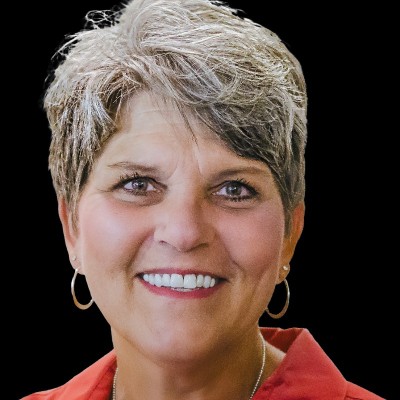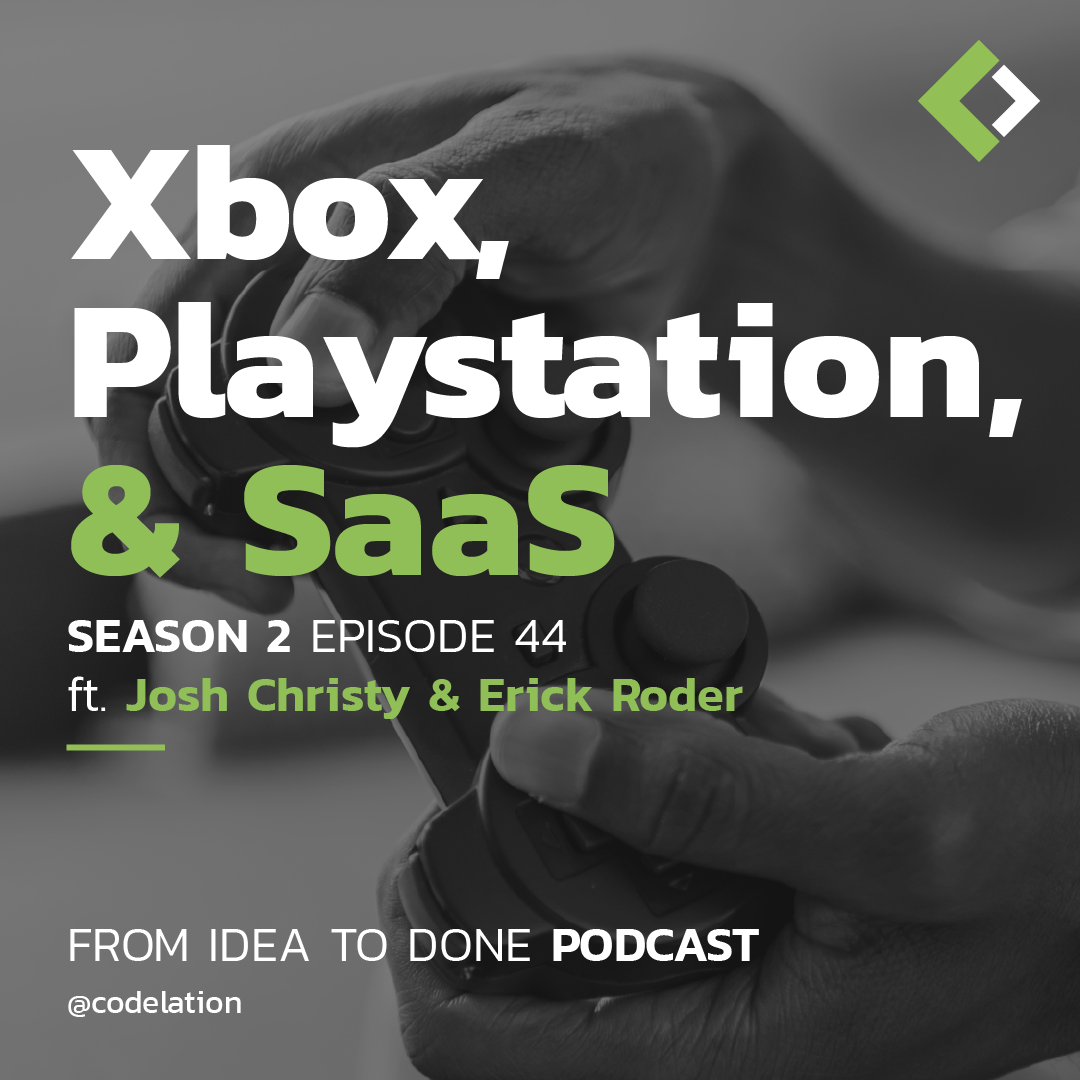Xbox, Playstation, and SaaS

Getting Real with Your Tribe ft. Jodee Bock
June 8, 2023VO: Get ready for your semi-regular dose of random ideas from the guys at Codelation. We like to talk about big ideas companies that are winning, and those that aren't along with current events in our crazy world of software startups. So come along with Erick and Josh, who challenge you to think big, start small and turn your ideas into something on this episode of, from idea to done.
Josh: Hey everyone I'm Josh.
Erick: and I'm Erick and today's idea is bringing the SAS model outside of the world of software. And I know that you don't play video games at all, but the new generation of systems are launching pretty soon. And one of the more interesting things about that I saw is that X-Box is coming out and it's giving people the option to pay for their hardware as a subscription. And that's something that's like really common in our world of software and software development, but this has never really happened with video game hardware before. So for normal people out there instead of software nerds, Josh, can you explain what SAS is and what are your thoughts on using that pricing model outside of software?
Josh: Yeah, SAS, um, and a number of other asses. I'm an air quote that is so like, uh, SAS is software as a service, um, there's pass platform as a service. There's all sorts of other, like I said, assets that are out there. And basically what it means is that you pay for something on a monthly subscription versus buying the rights to own it. And that's something, you know, we've, um, seen with cell phone providers that once you get over a 500 or a thousand dollars cell phone, it's really difficult to get the average consumer to say, yes, I want to give that much money towards my phone, but if you can get them to, you know, pay $25 a month forever, that's a lot easier sell. So, you know, I, I think, uh, looking into the Xbox a little bit and the devices, what right around 500 yep.
Erick: Bigger model was 500. Okay.
Josh: You know, I, I see that being able to go in and license the hardware over a series of year or two years, it's just going to drive adoption of new technology. And those, those price points above 500 gets more difficult. Um, you know, I, I think that most consumers don't look at the entire cost of a product in this way, but just what the monthly payments are. So I think this really makes
Erick: Sense, you know, and it's one less pizza trip a month, right? That's, that's a little, that's a lot easier to actually have a lift for me than to, you know, save $500, which I'm trying to do to get it. But, but we've seen this kind of in other businesses before, and we even stayed how crazy Peloton is. Cause they were one of the few companies that took the subscription model and pay for the hardware upfront. And it was just kind of crazy that they were able to be successful doing that, but they've actually have creeped on them since, and now you can the bike with the service with no interested in. So do you kind of see this trend of monthly pricing going into other markets and other products?
Josh: Yeah. You know, we talked about like the cell phone side of things. I definitely think that it's going to be more common. And I think, you know, it really started probably 30 years ago with like financing vehicles. You know, I'm looking at a new vehicle at some point in my future and you know, how can you rationalize paying $80,000 for a new suburban, like just doesn't make sense. I
Erick: Wish it made sense for it. Wouldn't it be a nice world if you're like, oh yes. I'd like a new car today. Thank you. Big of money. You know, and I, this happened with me with one of my recent purchases too, you know, we got our stimulus checks and I wanted to combine that with all of the money I saved by not going out to eat this spring. And I was just going to go in and buy a bed. And I ended up financing over the next five years because it was zero interest. And the interesting thing of that is it's going to cost like 50 to a hundred bucks for my whole new bedroom for five years. But I think that I'm just going to be paying 50 to a hundred bucks for new furniture, kind of for the rest of my life and just kind of upgrading as soon as that, you know, that debt is paid down. So they got me. But do you have anything that you guys are doing? That's like nontraditional and switching to monthly payments,
Josh: You know, nothing terribly crazy on our end. You know, I know we had the episode of like the YouTube TV and cutting the cord and I think that's a lot more common. Um, so nothing really crazy that we're trying to finance or, you know, look at alternative payment methods, but you know, like I said, I think this is just going to be a lot more common as, as price points get higher with, with hardware and other solutions.
Erick: I doubt being a human is ever going to cost less money. And the thing is like, hi, I'm so bad at saving money that this just, I feel like for me, this is just going to be completely how I go about most of my purchases, if it's an option going forward, I think it's going to be kind of interesting to see, you know, how Microsoft has done this because they changed some of their other products. They do that with their actual software too.
Josh: Yeah, I do think you'll see it more and more. And from solely a business perspective, like the things that I think have really kept Microsoft moving forward has been the X-Box platform and then also the Azure, their hosting platform, and those have led to record quarters for them. Um, so I think by moving this one step further and removing the barrier of, you know, buying the hardware to really licensing it, it makes a lot sense. Um, this happened with software over the last decade. You don't buy Photoshop anymore. You license it every single month. Um, so I, it's a lot more sensical for companies to get into those recurring payments versus trying to educate the customer as to why they should upgrade the thing that already works for them. Well,
Erick: And I think it's nice from a business standpoint too. You can you have that buffer? You're like, oh, we built something and it needs to be addressed and it needs to be changed. We can do that right now and just kind of push those changes up and don't have to like, wait till version seven, a Photoshop, cause it costs $700 to fix the thing. You have a problem with like that that's tricky for, you know, both sides of the business. So I think it will be switching to this big question. Are you going to get either of these new systems?
Josh: You know, this might, might be a shock to you, but I might actually consider the Xbox since it's a subscription. I don't have to shell out 500 bucks and all the, you know, I'm sure there's still being game prices and everything else involved, but you know, it's a lot more digestible for me. Um, long-term
Erick: I, I thought that you were going to do a hard pass, so that it's kind of interesting. And I kind of think back to like prick, when I used to rent video games, I've been paying 20 bucks a month for video games, my entire life. And, and I don't think that that's going to change my, my follow up question. If you, if you did say hard pass was what, what would you have said if your kids wanted one?
Josh: Um, you know, I, I have flashbacks to junior high to wherever you'd go to the videos, you'd go to blockbuster or whatever else. And you would rent a console plus some games for the week and you'd get this big armor tote and you'd take it home and you would do nothing, but be in front of the TV for the entire next week. Cause it costs 35 bucks for the week or whatever the heck it was. It was a good week. Um, but if, if my kids asked for one, I would probably say no, um, they've got their iPads. Um, probably wouldn't commit to a new platform for my seven and five olds and that's fair. Um, but if I had older kids, I, you know, 30 bucks a month is going to be cheaper than taking them to a movie 100 times over. So
Erick: Yeah. And I think that that was kind of the going old school back at the pinnacle of gaming with the super Nintendo, it was cheaper for my mom to rent me a video game than to let me go to a movie and eat a little bit of food. And so, you know, Sony and place or Sony and X-Box, they've always kind of been fighting and I'm interested to see how like sales of these overall system pans out.
Josh: Yeah, absolutely. I agree with you. So thanks for listening. We're hoping you can know of a startup that can use our advice and random thoughts. If you do send them over to correlation.com to hear the next podcast.
Sign up to receive email updates
Enter your name and email address below and I'll send you periodic updates about the podcast.
